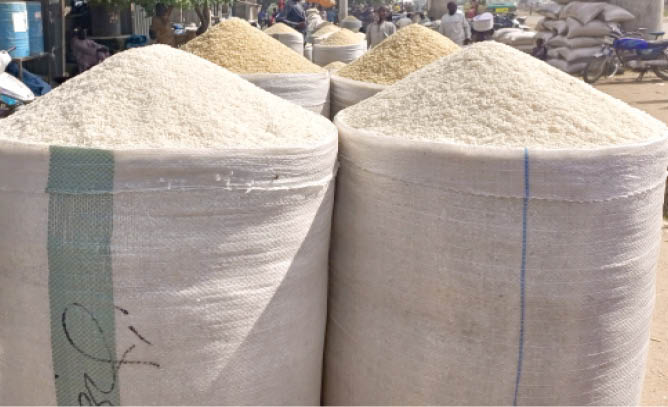At dawn, immediately after Fajr prayer, work starts.
Her two boys return from the mosque and pick up their brooms. Their task is simple, yet tiring – to sweep their whole house, the front compound and the entire street that their house is on. For the girls, their jobs involve getting breakfast ready and making sure the trays, calabash bowls (Kwarya) and weaved discs (Faifai) are clean and all accounted for.
After sweeping, the boys sit down to a hot breakfast consisting of the previous day’s tuwo warmed with pepper and manshanu. After eating, the girls clear away and wash up while the boys bring out the previous day’s sacks of rice and proceed to spread the grains on the entire length of the street. The street on which they are housed stretches on for about two kilometers before opening up to the main road. Sunshine is enlisted for drying. It takes about two hours for the boys to ensure that all the 20 or so bags of grains are properly spread. They cough and heave while doing this task. The sun hits their backs and burns their skin.
When they are done, they lie in the shade and rest. Now, it is the turn of the girls. Together with their mother, the girls divide themselves into groups. One group is in charge of parboiling the rice, another group manually pounds the rice with a mortar and pestle in order to de-husk the paddy rice, while yet another group is seated on mats sifting and de-stoning the rice. The latter’s job is deemed much easier as they can do it while sitting. During all these processes, dust and dirt rises from the grains, covering the women. They all sneeze intermittently.
- ‘Nigeria On Autopilot’, Tinubu’s strong supporter Laments
- Obi knocks Tinubu for extending leave, sending Shettima to Sweden
When one group finishes, the boys bring in a new batch of sun-dried paddy rice and the process starts again. They continue all day, stopping only for lunch and prayer.
It is laborious work. This is their work all day and every day of their lives except for days of festivities like Eid. For the children, there is no school, only work.
Sadiya presented to the clinic with a history of recurrent cough. This current episode had defied all cough syrups, and so, with the encouragement of her sister, she presented to the clinic. The cough was dry and chesty. She had difficulty breathing. Asked what she did for a living, the 55-year-old woman said she had milled rice all her life. She knew the entire process by heart. It was her parents’ profession, and now, it was her profession as well. Her father had passed away at the age of 60 from a persistent cough. All her children were involved in the work. In fact, she said it was the profession of almost 80 per cent of her village people.
The skin on her hands was dark and sunburnt, her face weather-beaten. She had very low vision in her left eye and her voice had taken a raspy tone. Several investigations later, I broke the news to her – she had Chronic Obstructive Pulmonary Disease (COPD). She would require medication, but most importantly, she needed to be admitted for oxygen therapy as her oxygen saturation level was low.
Treatment was only the first step. I told her that her condition was an occupational hazard and that she would have to quit the milling business. She looked at me like I was crazy!
Processing of rice even when done in mechanised industries is a dangerous business. After harvesting, paddy is threshed and sent to mills. In the mill, paddy is cleaned, parboiled (in case of white rice, parboiling is avoided), dried and hulled. Then, bran is sorted and rice is polished, sorted for quality and sent for sale.
Air pollution is high in mills, especially during cleaning, parboiling and hulling. Exposure to fungal spores containing aflatoxin in improperly stored paddy can potentiate the inflammatory reaction in lungs.
Additionally, rice husk contains high percentage of silica, which itself is detrimental to human lungs. In mills, this husk is either blown using blower or burnt as a fuel for boiler. The boiler generates fly ash, suspended particulate matter (SPM), smoke and oxides of carbon. The longstanding irritation caused by these organic and inorganic dust results in mucosal hypertrophy, leading to chronic respiratory diseases, as well as other occupational diseases like pulmonary fibrosis, pleural thickening and lung carcinoma.
Because rice mill workers usually belong to an unorganised sector, there is poor training regarding hazard prevention. There is lack of protective gear for those working in the milling industries, and absolutely no compensation for these workers as regards to the occupational hazards involved.
For those working in rural villages like Sadiya and her children, they have no way of knowing how to protect themselves. When I explained to them the importance of using face masks and shield to protect themselves from inhaling dust and toxins, as well as protecting their eyes, Sadiya simply smiled and said: “I hear what you are saying, Likita, but how can I afford all these things? How can my children and I wear facemasks? We will be the laughingstock of the entire village! This work that I have been doing all my life? This work that killed my father? This work of all my great-grand parents? If it is my fate that this work would kill me, then so be it.”
How does one argue with this type of mentality?

 Join Daily Trust WhatsApp Community For Quick Access To News and Happenings Around You.
Join Daily Trust WhatsApp Community For Quick Access To News and Happenings Around You.


